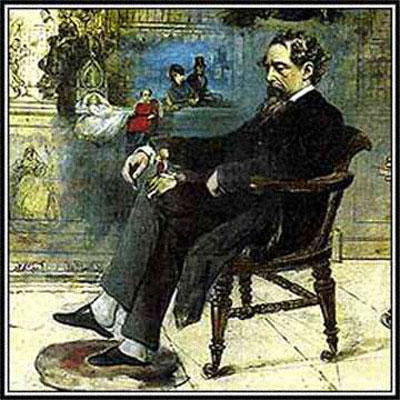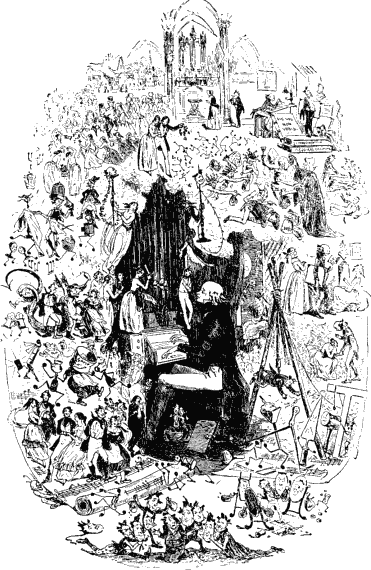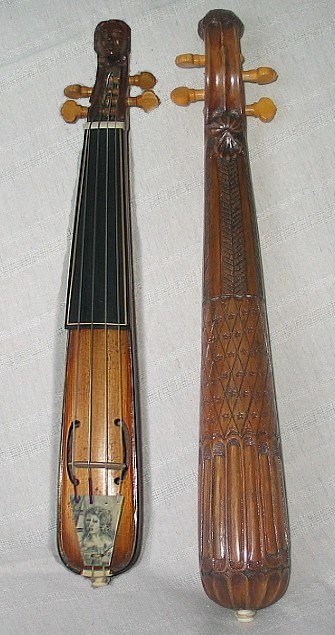A Charles Dickens Bicentennial Moment
Charles Dickens And Music
By James T. Lightwood
Author of Hymn-Tunes and their Story
(Editor’s note: Continuing our Bicentennial Dickens salute, this month we remain focused on our subject’s relationship to music, both as a musician and as an author, as chronicled in James T. Lightwood’s 1912 study of Charles Dickens And Music, originally published in London by Charles H. Kelly. Following last month’s installment of Chapter I, Chapter II deals with the various instruments referenced in Dickens’s novels, with the added context of each one’s place (or lack thereof) in Victorian music.
***
The kind-hearted Tom Pinch, from Dickens’s novel Martin Chuzzlewit, at the organ.CHAPTER II
INSTRUMENTAL COMBINATIONS
VIOLIN, VIOLONCELLO, HARP, PIANODickens' orchestras are limited, both in resources and in the number of performers; in fact, it would be more correct to call them combinations of instruments. Some of them are of a kind not found in modern works on instrumentation, as, for instance, at the party at Trotty Veck's (Chimes) when a 'band of music' burst into the good man's room, consisting of a drum, marrow-bones and cleavers, and bells, 'not the bells but a portable collection on a frame.' We gather from Leech's picture that other instrumentalists were also present. Sad to relate, the drummer was not quite sober, an unfortunate state of things, certainly, but not always confined to the drumming fraternity, since in the account of the Party at Minerva House (“Tales,” from Sketches by Boz) we read that amongst the numerous arrivals were 'the pianoforte player and the violins: the harp in a state of intoxication.'
We have an occasional mention of a theatre orchestra, as, for instance, when the Phenomenon was performing at Portsmouth (Nicholas Nickleby):
'Ring in the orchestra, Grudden.'
That useful lady did as she was requested, and shortly afterwards the tuning of three fiddles was heard, which process, having been protracted as long as it was supposed that the patience of the orchestra could possibly bear it, was put a stop to by another jerk of the bell, which, being the signal to begin in earnest, set the orchestra playing a variety of popular airs with involuntary variations.
On one occasion Dickens visited Vauxhall Gardens by day, where 'a small party of dismal men in cocked hats were "executing" the overture to Tancredi,' but he does not, unfortunately, give us any details about the number or kind of instruments employed. This would be in 1836, when the experiment of day entertainments was given a trial, and a series of balloon ascents became the principal attraction. Forster tells us that Dickens was a frequent visitor at the numerous gardens and places of entertainment which abounded in London, and which he knew better than any other man. References will be found elsewhere to the music at the Eagle (p. 47) and the White Conduit Gardens (p. 93).
Violin and Kit
We meet with but few players on the violin, and it is usually mentioned in connexion with other instruments, though it was to the strains of a solitary fiddle that Simon Tappertit danced a hornpipe for the delectation of his followers, while the same instrument supplied the music at the Fezziwig's ball.
In came a fiddler with a music-book, and went up to the lofty desk, and made an orchestra of it, and tuned like fifty stomach-aches.
The Irish hornpipe danceThe orchestra at the 'singing-house' provided for Jack's amusement when ashore (Uncommercial Traveler, 5) consisted of a fiddle and tambourine; while at dances the instruments were fiddles and harps. It was the harps that first aroused Mr. Jingle's curiosity, as he met them being carried up the staircase of The Bull at Rochester, while, shortly after, the tuning of both harps and fiddles inspired Mr. Tupman with a strong desire to go to the ball. Sometimes the orchestra is a little more varied. At the private theatricals which took place at Mrs. Gattleton's (“Tales,” from Sketches by Boz, 9), the selected instruments were a piano, flute, and violoncello, but there seems to have been a want of proper rehearsal.
Ting, ting, ting! went the prompter's bell at eight o'clock precisely, and dash went the orchestra into the overture to the Men of Prometheus. The pianoforte player hammered away with laudable perseverance, and the violoncello, which struck in at intervals, sounded very well, considering. The unfortunate individual, however, who had undertaken to play the flute accompaniment 'at sight' found, from fatal experience, the perfect truth of the old adage, 'Out of sight, out of mind'; for being very near-sighted, and being placed at a considerable distance from his music-book, all he had an opportunity of doing was to play a bar now and then in the wrong place, and put the other performers out. It is, however, but justice to Mr. Brown to say that he did this to admiration. The overture, in fact, was not unlike a race between the different instruments; the piano came in first by several bars, and the violoncello next, quite distancing the poor flute; for the deaf gentleman too-too'd away, quite unconscious that he was at all wrong, until apprised, by the applause of the audience, that the overture was concluded.
It was probably after this that the pianoforte player fainted away, owing to the heat, and left the music of Masaniello to the other two. There were differences between these remaining musicians and Mr. Harleigh, who played the title rôle, the orchestra complaining that 'Mr. Harleigh put them out, while the hero declared that the orchestra prevented his singing a note.'
It was to the strains of a wandering harp and fiddle that Marion and Grace Jeddler danced 'a trifle in the Spanish style,' much to their father's astonishment as he came bustling out to see who 'played music on his property before breakfast.'
The ‘kit’ violin used by dancing-masters in Dickens’s time and mentioned in Bleak House and The Pickwick PapersThe little fiddle commonly known as a 'kit' that dancing-masters used to carry in their capacious tail coat pockets was much more in evidence in the middle of last century than it is now. Caddy Jellyby (Bleak House) after her marriage to a dancing-master, found a knowledge of the piano and the kit essential, and so she used to practise them assiduously. When Sampson Brass hears Kit's name for the first time he says to Swiveller:
'Strange name--name of a dancing-master's fiddle, eh, Mr. Richard?'
We must not forget the story of a fine young Irish gentleman, as told by the one-eyed bagman to Mr. Pickwick and his friends, who,
being asked if he could play the fiddle, replied he had no doubt he could, but he couldn't exactly say for certain, because he had never tried.Violoncello
Mr. Morfin (Dombey & Son) 'a cheerful-looking, hazel-eyed elderly bachelor,' was
a great musical amateur-in his way-after business, and had a paternal affection for his violoncello, which was once in every week transported from Islington, his place of abode, to a certain club-room hard by the Bank, where quartets of the most tormenting and excruciating nature were executed every Wednesday evening by a private party.
His habit of humming his musical recollections of these evenings was a source of great annoyance to Mr. James Carker, who devoutly wished 'that he would make a bonfire of his violoncello, and burn his books with it.' There was only a thin partition between the rooms which these two gentlemen occupied, and on another occasion Mr. Morfin performed an extraordinary feat in order to warn the manager of his presence.
I have whistled, hummed tunes, gone accurately through the whole of Beethoven's Sonata in B, to let him know that I was within hearing, but he never heeded me.
This particular sonata has not hitherto been identified.
Jacqueline du Pré, cello solo, Intermezzo from Goyescas by Enrique GranadosIt is comforting to know that the fall of the House of Dombey made no difference to Mr. Morfin, who continued to solace himself by producing 'the most dismal and forlorn sounds out of his violoncello before going to bed,' a proceeding which had no effect on his deaf landlady, beyond producing 'a sensation of something rumbling in her bones.'
Nor were the quartet parties interfered with. They came round regularly, his violoncello was in good tune, and there was nothing wrong in his world. Happy Mr. Morfin!
Another 'cellist was the Rev. Charles Timson, who, when practising his instrument in his bedroom, used to give strict orders that he was on no account to be disturbed.
It was under the pretence of buying 'a second-hand wiolinceller' that Bucket visited the house of the dealer in musical instruments in order to effect the arrest of Mr. George (Bleak House).
Harp
The harp was a fashionable drawing-room instrument in the early Victorian period, although the re-introduction of the guitar temporarily detracted from its glory. It was also indispensable in providing music for dancing-parties and concerts. When Esther Summerson went to call on the Turveydrops (Bleak House) she found the hall blocked up with a grand piano, a harp, and various other instruments which had been used at a concert. As already stated, it was the sight of these instruments being carried up the stairs at The Bull in Rochester that aroused Mr. Jingle's curiosity (Pickwick Papers) and led to the discovery that a ball was in prospect.
We must not forget the eldest Miss Larkins, one of David Copperfield's early, fleeting loves. He used to wander up and down outside the home of his beloved and watch the officers going in to hear Miss L. play the harp. On hearing of her engagement to one of these he mourned for a very brief period, and then went forth and gloriously defeated his old enemy the butcher boy. What a contrast between this humour and the strange scene in the drawing-room at James Steerforth's home after Rosa Dartle had sung the strange weird Irish song to the accompaniment of her harp! And how different, again, the scene in the home of Scrooge's nephew (C.C.) when, after tea, 'they had some music.'
Scrooge's niece played well upon the harp; and played, among other things, a simple little air.
It reminded Scrooge of a time long past.
He softened more and more; and thought that if he could have listened to it often, years ago, he might have cultivated the kindnesses of life for his own happiness with his own hand.
Pachelbel’s Canon in D, performed by the Silicon Valley Chapter of the American Harp Society. ‘He softened more and more; and thought that if he could have listened to it often, years ago, he might have cultivated the kindnesses of life for his own happiness with his own hand.’Little Paul Dombey told Lady Skettles at the breaking-up party that he was very fond of music, and he was very, very proud of his sister's accomplishments both as player and singer. Did they inherit this love from their father? 'You are fond of music,' said the Hon. Mrs. Skewton to Mr. Dombey during an interval in a game of picquet. 'Eminently so,' was the reply. But the reader must not take him at his word. When Edith (the future Mrs. Dombey) entered the room and sat down to her harp,
Mr. Dombey rose and stood beside her, listening. He had little taste for music, and no knowledge of the strain she played; but he saw her bending over it, and perhaps he heard among the sounding strings some distant music of his own.
Yet when she went to the piano and commenced to sing Mr. Dombey did not know that it was 'the air that his neglected daughter sang to his dead son'!
Piano
Lady musicians are numerous, and of very varied degrees of excellence. Amongst the pianists is Miss Teresa Malderton, who nearly fell a prey to that gay deceiver Mr. Horatio Sparkins (“Tales,” from Sketches by Boz, 5). Her contribution to a musical evening was 'The Fall of Paris,' played, as Mr. Sparkins declared, in a masterly manner.
There was a song called 'The Fall of Paris,' but it is most probable that Dickens was thinking of a very popular piece which he must have often heard in his young days, of which the full title was
The Surrender of Paris. A characteristic Divertimento for the Pianoforte, including the events from the Duke of Wellington and Prince Blucher's marching to that capital to the evacuation by the French troops and taking possession by the Allies, composed by Louis Jansen, 1816.
Not the least curious section of this piece of early programme music is a moderato recording the various articles of the capitulation. These are eighteen in number, and each has its own 'theme.' The interspersion of some discords seems to imply serious differences of opinion between the parties to the treaty.
There was also a song called 'The Downfall of Paris,' the first verse of which was
Great news I have to tell you all,
Of Bonaparte and a' that;
How Paris it has got a fall,
He's lost his plans and a' that.Chorus.
Rise up, John Bull, rise up and sing,
Your chanter loudly blaw that;
Lang live our auld and worthy king,
Success to Britain, a' that.The instrument beloved of Miss Tox (Dombey & Son) was the harpsichord, and her favourite piece was the 'Bird Waltz,' while the 'Copenhagen Waltz' was also in her repertoire. Two notes of the instrument were dumb from disuse, but their silence did not impoverish the rendering. Caddy Jellyby found it necessary to know something of the piano, in order that she might instruct the 'apprentices' at her husband's dancing-school.
Another performer was Mrs. Namby, who entertained Mr. Pickwick with solos on a square piano while breakfast was being prepared. When questioned by David Copperfield as to the gifts of Miss Sophy Crewler, Traddles explained that she knew enough of the piano to teach it to her little sisters, and she also sang ballads to freshen up her family a little when they were out of spirits, but 'nothing scientific.' The guitar was quite beyond her. David noted with much satisfaction (though he did not say so) that his Dora was much more gifted musically.
Bach's Concerto No.5 (2nd & 3rd movements) played by Glenn Gould, September 11th 1957, with Nicholas Goldschmidt conducting the CBC Vancouver Orchestra.When Dickens wrote his earlier works it was not considered the correct thing for a gentleman to play the piano, though it might be all very well for the lower classes and the music teacher. Consequently we read of few male performers on the instrument. Mr. Skimpole could play the piano, and of course Jasper had a 'grand' in his room at Cloisterham.
At one time, if we may believe the turnkey at the Marshalsea prison, William Dorrit had been a pianist, a fact which raised him greatly in the turnkey's opinion.
Brought up as a gentleman, he was, if ever a man was. Educated at no end of expense. Went into the Marshal's house once to try a new piano for him. Played it, I understand, like one o'clock--beautiful.
In the Collected Papers we have a picture of the 'throwing off young gentleman,' who strikes a note or two upon the piano, and accompanies it correctly (by dint of laborious practice) with his voice. He assures
a circle of wondering listeners that so acute was his ear that he was wholly unable to sing out of tune, let him try as he would.
Mr. Weller senior laid a deep plot in which a piano was to take a prominent part. His object was to effect Mr. Pickwick's escape from the Fleet.
Me and a cab'net-maker has dewised a plan for gettin' him out. 'A pianner, Samivel, a pianner,' said Mr. Weller, striking his son on the chest with the back of his hand, and falling back a step or two.
'Wot do you mean?' said Sam.
'A pianner-forty, Samivel,' rejoined Mr. Weller, in a still more mysterious manner, 'as he can have on hire; vun as von't play, Sammy.'
'And wot 'ud be the good of that?' said Sam.
'There ain't no vurks in it,' whispered his father. 'It 'ull hold him easy, vith his hat and shoes on; and breathe through the legs, vich is holler.'
But the usually dutiful Sam showed so little enthusiasm for his father's scheme that nothing more was heard of it.
Next Month: Chapter III: Various Instruments—Flute, Organ, Guitar (And Some Hummers)
James T. Lightwood’s Charles Dickens and Music is available as a free e-book at Project Gutenberg.
Founder/Publisher/Editor: David McGee
Contributing Editors: Billy Altman, Laura Fissinger, Christopher Hill, Derk Richardson
Logo Design: John Mendelsohn (www.johnmendelsohn.com)
Website Design: Kieran McGee (www.kieranmcgee.com)
Staff Photographers: Audrey Harrod (Louisville, KY; www.flickr.com/audreyharrod), Alicia Zappier (New York)
E-mail: thebluegrassspecial@gmail.com
Mailing Address: David McGee, 201 W. 85 St.—5B, New York, NY 10024





